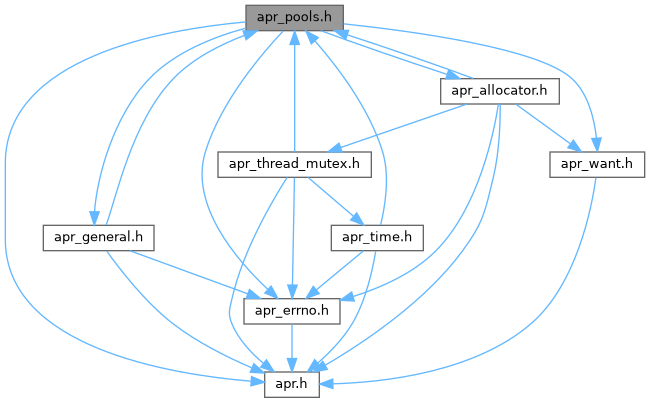|
| apr_status_t | apr_pool_initialize (void) |
| |
| void | apr_pool_terminate (void) |
| |
| apr_status_t | apr_pool_create_ex (apr_pool_t **newpool, apr_pool_t *parent, apr_abortfunc_t abort_fn, apr_allocator_t *allocator) |
| |
| apr_status_t | apr_pool_create_unmanaged_ex (apr_pool_t **newpool, apr_abortfunc_t abort_fn, apr_allocator_t *allocator) |
| |
| apr_status_t | apr_pool_create_ex_debug (apr_pool_t **newpool, apr_pool_t *parent, apr_abortfunc_t abort_fn, apr_allocator_t *allocator, const char *file_line) |
| |
| apr_status_t | apr_pool_create_unmanaged_ex_debug (apr_pool_t **newpool, apr_abortfunc_t abort_fn, apr_allocator_t *allocator, const char *file_line) |
| |
| apr_status_t | apr_pool_create (apr_pool_t **newpool, apr_pool_t *parent) |
| |
| apr_status_t | apr_pool_create_unmanaged (apr_pool_t **newpool) |
| |
| apr_allocator_t * | apr_pool_allocator_get (apr_pool_t *pool) |
| |
| void | apr_pool_clear (apr_pool_t *p) |
| |
| void | apr_pool_clear_debug (apr_pool_t *p, const char *file_line) |
| |
| void | apr_pool_destroy (apr_pool_t *p) |
| |
| void | apr_pool_destroy_debug (apr_pool_t *p, const char *file_line) |
| |
| void * | apr_palloc (apr_pool_t *p, apr_size_t size) |
| |
| void * | apr_palloc_debug (apr_pool_t *p, apr_size_t size, const char *file_line) |
| |
| void * | apr_pcalloc (apr_pool_t *p, apr_size_t size) |
| |
| void * | apr_pcalloc_debug (apr_pool_t *p, apr_size_t size, const char *file_line) |
| |
| void | apr_pool_abort_set (apr_abortfunc_t abortfunc, apr_pool_t *pool) |
| |
| apr_abortfunc_t | apr_pool_abort_get (apr_pool_t *pool) |
| |
| apr_pool_t * | apr_pool_parent_get (apr_pool_t *pool) |
| |
| int | apr_pool_is_ancestor (apr_pool_t *a, apr_pool_t *b) |
| |
| void | apr_pool_tag (apr_pool_t *pool, const char *tag) |
| |
| const char * | apr_pool_get_tag (apr_pool_t *pool) |
| |
| apr_status_t | apr_pool_userdata_set (const void *data, const char *key, apr_status_t(*cleanup)(void *), apr_pool_t *pool) |
| |
| apr_status_t | apr_pool_userdata_setn (const void *data, const char *key, apr_status_t(*cleanup)(void *), apr_pool_t *pool) |
| |
| apr_status_t | apr_pool_userdata_get (void **data, const char *key, apr_pool_t *pool) |
| |
| void | apr_pool_cleanup_register (apr_pool_t *p, const void *data, apr_status_t(*plain_cleanup)(void *), apr_status_t(*child_cleanup)(void *)) |
| |
| void | apr_pool_pre_cleanup_register (apr_pool_t *p, const void *data, apr_status_t(*plain_cleanup)(void *)) |
| |
| void | apr_pool_cleanup_kill (apr_pool_t *p, const void *data, apr_status_t(*cleanup)(void *)) |
| |
| void | apr_pool_child_cleanup_set (apr_pool_t *p, const void *data, apr_status_t(*plain_cleanup)(void *), apr_status_t(*child_cleanup)(void *)) |
| |
| apr_status_t | apr_pool_cleanup_run (apr_pool_t *p, void *data, apr_status_t(*cleanup)(void *)) |
| |
| apr_status_t | apr_pool_cleanup_null (void *data) |
| |
| void | apr_pool_cleanup_for_exec (void) |
| |
| void | apr_pool_owner_set (apr_pool_t *pool, apr_uint32_t flags) |
| |
| void | apr_pool_join (apr_pool_t *p, apr_pool_t *sub) |
| |
| apr_pool_t * | apr_pool_find (const void *mem) |
| |
| apr_size_t | apr_pool_num_bytes (apr_pool_t *p, int recurse) |
| |
| void | apr_pool_lock (apr_pool_t *pool, int flag) |
| |
APR memory allocation.
Resource allocation routines...
designed so that we don't have to keep track of EVERYTHING so that it can be explicitly freed later (a fundamentally unsound strategy — particularly in the presence of die()).
Instead, we maintain pools, and allocate items (both memory and I/O handlers) from the pools — currently there are two, one for per-transaction info, and one for config info. When a transaction is over, we can delete everything in the per-transaction apr_pool_t without fear, and without thinking too hard about it either.
Note that most operations on pools are not thread-safe: a single pool should only be accessed by a single thread at any given time. The one exception to this rule is creating a subpool of a given pool: one or more threads can safely create subpools at the same time that another thread accesses the parent pool.

